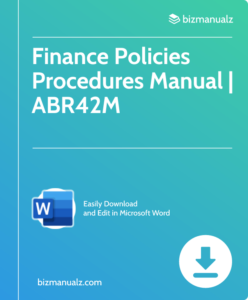What are Financial Controls?

Financial controls are internal controls, practices and procedures organizations use to regulate and manage their finances. They strive to guarantee accuracy, reliability, and integrity of financial information, and protect assets and prevent fraud. What are financial controls?
Financial Control Over Transactions
Organizations establish policies and regulations that dictate how financial transactions should be handled. This includes budgeting, accounting, invoicing, purchasing, and collecting payments. By having clear guidelines, businesses can reduce the risk of errors or irregularities in financial records and processes.
Financial controls systems involve dividing duties within and organization, so no single person has too much control over financial transactions. For example, someone approving purchases should not also be responsible for making payments.
Regular monitoring and assessment of financial performance are also essential components of effective financial control. Organizations use tools such as internal audits and financial reporting systems to track and evaluate their financial health. This helps management identify risks and anomalies early on, and take corrective action when required.
The Enron Corporation case is a stark reminder of the importance of financial controls. The company employed deceptive practices to hide debt and inflate profits, leading to its collapse. This scandal made clear the terrible consequences of inadequate financial controls and the need for increased transparency and accountability in corporate finance.
Without financial controls, businesses are like ships without captains, sailing towards the bankruptcy of the Bermuda Triangle.
Importance of Financial Controls in Business Operations
Financial controls are essential for the smooth running of business operations. They help manage and monitor finances, from budgeting to cash flow and reporting. By implementing such controls, risks can be mitigated, fraud prevented and compliance with regulations ensured.
Moreover, they provide reliable info, enabling informed decisions to be made. Without them, cash flow problems, mismanagement of funds, and difficulty tracking expenses can occur. So, businesses must prioritize the establishment and maintenance of financial controls to maximize performance.
These controls also aid long-term growth and sustainability. By aligning them with organizational goals and objectives, resources can be allocated and performance optimized. They also reveal areas for improvement and strategies to increase efficiency and profitability. Furthermore, financial controls build trust among investors, lenders, and other stakeholders, by demonstrating transparency and accountability.
Rollin Alan Quinones from Small Business Chron stated that “Financial control procedures keep track of where funds come from.” So, don’t forget: financial controls are essential and should not be overlooked!
Key Components of Financial Control
Financial controls are critical for and organization’s financial accounting success and stability. These controls act as a barrier against fraud, errors, and mismanagement – helping to maintain accurate financial records and promote transparency and accountability.
Here’s the gist of the main components of financial controls:
- Segregation of Duties: Prevents any one person from controlling all aspects of a financial transaction.
- Authorization: All transactions must be authorized by approved personnel before processing.
- Recording: Accurately records all financial transactions in and organized and timely manner.
- Reconciliation: Compares different sets of records or accounts to find any discrepancies and fix them immediately.
- Reporting: Presents clear and concise financial reports that demonstrate the true financial state of the organization.
- Monitoring: Regularly monitors the use of financial controls to detect any problems and address them.
Organizations must also have clear-cut policies, procedures, and rules controlling their finances. This creates a structure for financial controls to be applied properly. These individual components do not function alone. They combine to form a complete system of financial controls, which helps maintain the fiscal integrity of the organization.
Deloitte states that utilizing financial controls properly can dramatically decrease the danger of errors in financial statements. Ignoring financial controls in organizations is like playing with fire – except the fire is money and bad decisions are the fingers.
Implementing Financial Controls in Organizations
Financial controls are important for organizations, to prevent fraud and errors. Clear policies and procedures must be in place. and , duties must be segregated amongst staff. To stay on top of financial activities, ongoing monitoring and reporting is necessary. This includes frequent reconciliations, internal audits and timely reporting.
Transparency and accuracy are key to successful financial operations. To minimize risk, a culture of compliance is essential. Automated systems can also help streamline processes and reduce manual errors.
Common Challenges in Maintaining Effective Financial Controls
Maintaining effective financial controls can be a challenging task. Common issues arise, like a lack of transparency, insufficient documentation, internal conflicts of interest, resource limitations, and constant regulatory changes. These can create obstacles and require careful attention.
History has shown how weak or ineffective financial controls can lead to significant losses. It’s important to establish and maintain robust control systems to protect stakeholders and ensure long-term success.
Understanding and addressing these challenges is key to maintaining financial controls and building trust. Best practices can help organizations overcome hurdles and set a strong foundation for financial success. It’s a game of chess with money – one wrong move and you’re in checkmate!
Best Practices for Successful Financial Controls Implementation
It’s crucial for any organization to implement financial controls for stability and growth. Here are the best practices for successful implementation:
- Clearly lay out policies and procedures: Set transparent policies and rules to maintain accountability.
- Divide responsibilities: Assign different roles to different people to reduce fraud risks.
- Continual monitoring and analysis: Analyze financial controls regularly to spot any weak spots.
- Use tech: Leverage advanced software and tools to automate, boost accuracy, and keep up with regulations.
- Train and educate: Educate employees on financial controls and promote adherence to them.
- Do internal audits: Perform regular internal audits to assess effectiveness and find areas of improvement.
Adapt to changes in business, tech, and regulations by regularly reviewing financial controls. Don’t miss out on the opportunity to secure finances, manage risks, and boost operational efficiency. Implement these best practices for a safe future! Financial control failures: risky decisions that can bankrupt your company.
Case Studies: Examples of Financial Control Failures and Successes
Financial control failures and successes can show us the importance of effective financial management. Let’s look at some cases to understand the consequences of not having good internal controls and the benefits of having them.
Here is a table:
| Company | Failure or Success | Details |
|---|---|---|
| Enron Corporation | Failure | Enron had aggressive accounting which led to fraud. It caused one of the biggest bankruptcies ever. This shows how weak controls can hurt corporate success. |
| Apple Inc. | Success | Apple’s financial planning and control mechanisms have led to great growth and profits. Their ability to manage resources made them a market leader. |
| Worldcom | Failure | Worldcom had unethical practices with false accounting entries. It showed how important it is to act ethically. The company filed for bankruptcy after the scandal was uncovered. |
| Walmart Stores Inc. | Success | Walmart’s inventory management systems have helped them optimize their supply chain and be cost efficient. This shows how controls can help business success. |
Different organizations need different financial controls, depending on their industry, size, and situation. Failures show us pitfalls, and successes show us best practices.
GM was once in financial trouble, but they focused on improving their financial controls and cost reduction. This transformed GM and showed the power of effective financial control.
By looking at both failures and successes, we can learn and shape our own approaches to protect our organizations from risks. Without the proper financial controls, and organization’s success is like a game of Jenga played by a drunk elephant – it’s only a matter of time before it all falls apart.
Robust Financial Controls for Organizational Success
Financial controls are a must for any organization! They guarantee financial transactions are done accurately, economically, and in line with regulations and policies. These controls provide a system of checks and balances that protect against fraud, mistakes, and inaccurate reporting.
These controls are pivotal in the decision-making process. They provide precise and reliable financial data which helps the organization make informed choices about investments, budgeting, and resource allocation. Moreover, robust financial controls guarantee transparency and accountability within the organization.
Besides avoiding financial losses and guaranteeing accuracy, strong financial controls boost the organization’s reputation. Reliable financial reporting builds trust with stakeholders such as investors, lenders, and customers. It proves the organization is responsible and capable of managing finances well.
Effective financial controls also help organizations identify potential risks and take preventive measures. By regularly reviewing financial procedures, any irregularities or anomalies can be spotted early on. This proactive approach safeguards against potential fraud and other harmful activities.
Don’t miss out on the great advantages of financial controls! Implementing them is essential to secure your organization’s finances against fraud or errors. Take action now to create reliable financial practices that will contribute to your organization’s success in the future!
Frequently Asked Questions

Q: What are financial controls?
A: Financial controls refer to the processes and practices implemented by organizations to ensure the accurate recording of financial transactions, adherence to financial policies, and prevention of fraud or misappropriation of funds.
Q: Why are financial controls important?
A: Financial controls are important as they help maintain the integrity of financial data, safeguard assets, and ensure compliance with legal and regulatory requirements. They also provide a framework for effective risk management and help in making informed financial decisions.
Q: What are examples of financial controls?
A: Examples of financial controls include segregation of duties, where different individuals are responsible for different stages of a financial transaction; regular financial reporting and analysis; strong internal auditing processes; and the implementation of accounting software with built-in checks and balances.
Q: Who is responsible for financial controls?
A: The responsibility for financial controls lies with the management of and organization. This can include the finance department, the chief financial officer (CFO), internal auditors, and compliance officers. Ultimately, the entire organization is responsible for implementing and adhering to financial controls.
Q: How do financial controls prevent fraud?
A: Financial controls act as a deterrent to fraud by introducing checks and balances throughout the financial processes. They reduce the opportunities for fraud and provide early detection mechanisms. For example, segregation of duties ensures that no single individual has complete control over financial transactions, reducing the risk of fraudulent activities.
Q: How can I strengthen financial controls in my organization?
A: To strengthen financial controls, you can implement strict policies and procedures, automate financial processes to minimize errors, conduct regular internal audits, perform periodic risk assessments, provide training on financial controls to employees, and stay updated with relevant regulations and best practices in financial management.
















Leave a Reply